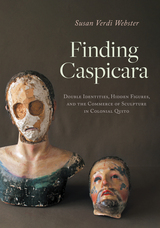102 books about Multiculturalism and 15
start with C
102 books about Multiculturalism and 15
102 books about Multiculturalism
15 start with C start with C
15 start with C start with C
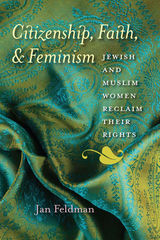
Citizenship, Faith, and Feminism
Jewish and Muslim Women Reclaim Their Rights
Jan Feldman
Brandeis University Press, 2011
Religious women in liberal democracies are “dual citizens” because of their contrasting status as members of both a civic community (in which their gender has no impact on their constitutional guarantee of equal rights) and a traditional religious community (which distributes roles and power based on gender). This book shows how these “dual citizens”—Orthodox Jewish women in Israel, Muslim women in Kuwait, and women of both those faiths in the U.S.—have increasingly deployed their civic citizenship rights in attempts to reform and not destroy their religions. For them, neither “exit” nor acquiescence to traditional religious gender norms is an option. Instead, they use the narrative of civic citizenship combined with a more authentic, if alternative reading of their faith tradition to improve their status.
[more]
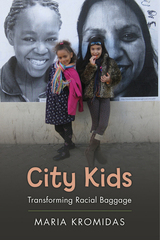
City Kids
Transforming Racial Baggage
Kromidas, Maria
Rutgers University Press, 2016
Cosmopolitanism—the genuine appreciation of cultural and racial diversity—is often associated with adult worldliness and sophistication. Yet, as this innovative new book suggests, children growing up in multicultural environments might be the most cosmopolitan group of all.
City Kids profiles fifth-graders in one of New York City’s most diverse public schools, detailing how they collectively developed a sophisticated understanding of race that challenged many of the stereotypes, myths, and commonplaces they had learned from mainstream American culture. Anthropologist Maria Kromidas spent over a year interviewing and observing these young people both inside and outside the classroom, and she vividly relates their sometimes awkward, often playful attempts to bridge cultural rifts and reimagine racial categories. Kromidas looks at how children learned race in their interactions with each other and with teachers in five different areas—navigating urban space, building friendships, carrying out schoolwork, dealing with the school’s disciplinary policies, and enacting sexualities. The children’s interactions in these areas contested and reframed race. Even as Kromidas highlights the lively and quirky individuals within this super-diverse group of kids, she presents their communal ethos as a model for convivial living in multiracial settings.
By analyzing practices within the classroom, school, and larger community, City Kids offers advice on how to nurture kids’ cosmopolitan tendencies, making it a valuable resource for educators, parents, and anyone else who is concerned with America’s deep racial divides. Kromidas not only examines how we can teach children about antiracism, but also considers what they might have to teach us.
[more]
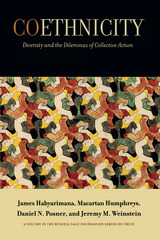
Coethnicity
Diversity and the Dilemmas of Collective Action
James Habyarimana
Russell Sage Foundation, 2009
Ethnically homogenous communities often do a better job than diverse communities of producing public goods such as satisfactory schools and health care, adequate sanitation, and low levels of crime. Coethnicity reports the results of a landmark study that aimed to find out why diversity has this cooperation-undermining effect. The study, conducted in a neighborhood of Kampala, Uganda, notable for both its high levels of diversity and low levels of public goods provision, hones in on the mechanisms that might account for the difficulties diverse societies often face in trying to act collectively. The Mulago-Kyebando Community Study uses behavioral games to explore how the ethnicity of the person with whom one is interacting shapes social behavior. Hundreds of local participants interacted with various partners in laboratory games simulating real-life decisions involving the allocation of money and the completion of joint tasks. Many of the subsequent findings debunk long-standing explanations for diversity's adverse effects. Contrary to the prevalent notion that shared preferences facilitate ethnic collective action, differences in goals and priorities among participants were not found to be structured along ethnic lines. Nor was there evidence that subjects favored the welfare of their coethnics over that of non-coethnics. When given the opportunity to act altruistically, individuals did not choose to benefit coethnics disproportionately when their actions were anonymous. Yet when anonymity was removed, subjects behaved very differently. With their actions publicly observed, subjects gave significantly more to coethnics, expected their partners to reciprocate, and expected that they would be sanctioned for a failure to cooperate. This effect was most pronounced among individuals who were otherwise least likely to cooperate. These results suggest that what may look like ethnic favoritism is, in fact, a set of reciprocity norms—stronger among coethnics than among non-coethnics—that make it possible for members of more homogeneous communities to take risks, invest, and cooperate without the fear of getting cheated. Such norms may be more subject to change than deeply held ethnic antipathies—a powerful finding for policymakers seeking to design social institutions in diverse societies. Research on ethnic diversity typically draws on either experimental research or field work. Coethnicity does both. By taking the crucial step from observation to experimentation, this study marks a major breakthrough in the study of ethnic diversity. A Volume in the Russell Sage Foundation Series on Trust
[more]
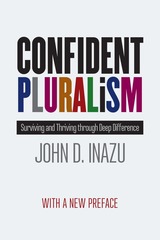
Confident Pluralism
Surviving and Thriving through Deep Difference
John D. Inazu
University of Chicago Press, 2018
In the three years since Donald Trump first announced his plans to run for president, the United States seems to become more dramatically polarized and divided with each passing month. There are seemingly irresolvable differences in the beliefs, values, and identities of citizens across the country that too often play out in our legal system in clashes on a range of topics such as the tensions between law enforcement and minority communities. How can we possibly argue for civic aspirations like tolerance, humility, and patience in our current moment?
In Confident Pluralism, John D. Inazu analyzes the current state of the country, orients the contemporary United States within its broader history, and explores the ways that Americans can—and must—strive to live together peaceably despite our deeply engrained differences. Pluralism is one of the founding creeds of the United States—yet America’s society and legal system continues to face deep, unsolved structural problems in dealing with differing cultural anxieties and differing viewpoints. Inazu not only argues that it is possible to cohabitate peacefully in this country, but also lays out realistic guidelines for our society and legal system to achieve the new American dream through civic practices that value toleration over protest, humility over defensiveness, and persuasion over coercion.
With a new preface that addresses the election of Donald Trump, the decline in civic discourse after the election, the Nazi march in Charlottesville, and more, this new edition of Confident Pluralism is an essential clarion call during one of the most troubled times in US history. Inazu argues for institutions that can work to bring people together as well as political institutions that will defend the unprotected. Confident Pluralism offers a refreshing argument for how the legal system can protect peoples’ personal beliefs and differences and provides a path forward to a healthier future of tolerance, humility, and patience.
In Confident Pluralism, John D. Inazu analyzes the current state of the country, orients the contemporary United States within its broader history, and explores the ways that Americans can—and must—strive to live together peaceably despite our deeply engrained differences. Pluralism is one of the founding creeds of the United States—yet America’s society and legal system continues to face deep, unsolved structural problems in dealing with differing cultural anxieties and differing viewpoints. Inazu not only argues that it is possible to cohabitate peacefully in this country, but also lays out realistic guidelines for our society and legal system to achieve the new American dream through civic practices that value toleration over protest, humility over defensiveness, and persuasion over coercion.
With a new preface that addresses the election of Donald Trump, the decline in civic discourse after the election, the Nazi march in Charlottesville, and more, this new edition of Confident Pluralism is an essential clarion call during one of the most troubled times in US history. Inazu argues for institutions that can work to bring people together as well as political institutions that will defend the unprotected. Confident Pluralism offers a refreshing argument for how the legal system can protect peoples’ personal beliefs and differences and provides a path forward to a healthier future of tolerance, humility, and patience.
[more]
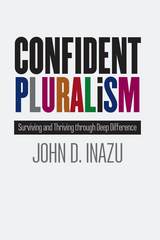
Confident Pluralism
Surviving and Thriving through Deep Difference
John D. Inazu
University of Chicago Press, 2016
In the three years since Donald Trump first announced his plans to run for president, the United States seems to become more dramatically polarized and divided with each passing month. There are seemingly irresolvable differences in the beliefs, values, and identities of citizens across the country that too often play out in our legal system in clashes on a range of topics such as the tensions between law enforcement and minority communities. How can we possibly argue for civic aspirations like tolerance, humility, and patience in our current moment?
In Confident Pluralism, John D. Inazu analyzes the current state of the country, orients the contemporary United States within its broader history, and explores the ways that Americans can—and must—strive to live together peaceably despite our deeply engrained differences. Pluralism is one of the founding creeds of the United States—yet America’s society and legal system continues to face deep, unsolved structural problems in dealing with differing cultural anxieties and differing viewpoints. Inazu not only argues that it is possible to cohabitate peacefully in this country, but also lays out realistic guidelines for our society and legal system to achieve the new American dream through civic practices that value toleration over protest, humility over defensiveness, and persuasion over coercion.
The paperback edition includes a new preface that addresses the election of Donald Trump, the decline in civic discourse after the election, the Nazi march in Charlottesville, and more, this new edition of Confident Pluralism is an essential clarion call during one of the most troubled times in US history. Inazu argues for institutions that can work to bring people together as well as political institutions that will defend the unprotected. Confident Pluralism offers a refreshing argument for how the legal system can protect peoples’ personal beliefs and differences and provides a path forward to a healthier future of tolerance, humility, and patience.
In Confident Pluralism, John D. Inazu analyzes the current state of the country, orients the contemporary United States within its broader history, and explores the ways that Americans can—and must—strive to live together peaceably despite our deeply engrained differences. Pluralism is one of the founding creeds of the United States—yet America’s society and legal system continues to face deep, unsolved structural problems in dealing with differing cultural anxieties and differing viewpoints. Inazu not only argues that it is possible to cohabitate peacefully in this country, but also lays out realistic guidelines for our society and legal system to achieve the new American dream through civic practices that value toleration over protest, humility over defensiveness, and persuasion over coercion.
The paperback edition includes a new preface that addresses the election of Donald Trump, the decline in civic discourse after the election, the Nazi march in Charlottesville, and more, this new edition of Confident Pluralism is an essential clarion call during one of the most troubled times in US history. Inazu argues for institutions that can work to bring people together as well as political institutions that will defend the unprotected. Confident Pluralism offers a refreshing argument for how the legal system can protect peoples’ personal beliefs and differences and provides a path forward to a healthier future of tolerance, humility, and patience.
[more]
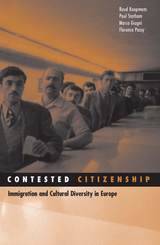
Contested Citizenship
Immigration and Cultural Diversity in Europe
Ruud Koopmans
University of Minnesota Press, 2005
From international press coverage of the French government’s attempt to prevent Muslims from wearing headscarves to terrorist attacks in Madrid and the United States, questions of cultural identity and pluralism are at the center of the world’s most urgent events and debates. Presenting an unprecedented wealth of empirical research garnered during ten years of a cross-cultural project, Contested Citizenship addresses these fundamental issues by comparing collective actions by migrants, xenophobes, and antiracists in Germany, Britain, France, the Netherlands, and Switzerland.
Revealing striking cross-national differences in how immigration and diversity are contended by different national governments, these authors find that how citizenship is constructed is the key variable defining the experience of Europe’s immigrant populations. Contested Citizenship provides nuanced policy recommendations and challenges the truism that multiculturalism is always good for immigrants. Even in an age of European integration and globalization, the state remains a critical actor in determining what points of view are sensible and realistic—and legitimate—in society.
Ruud Koopmans is professor of sociology at Free University, Amsterdam. Paul Statham is reader in political communications at the University of Leeds. Marco Giugni is a researcher and teacher of political science at the University of Geneva. Florence Passy is assistant professor of political science at the University of Lausanne, Switzerland.
Revealing striking cross-national differences in how immigration and diversity are contended by different national governments, these authors find that how citizenship is constructed is the key variable defining the experience of Europe’s immigrant populations. Contested Citizenship provides nuanced policy recommendations and challenges the truism that multiculturalism is always good for immigrants. Even in an age of European integration and globalization, the state remains a critical actor in determining what points of view are sensible and realistic—and legitimate—in society.
Ruud Koopmans is professor of sociology at Free University, Amsterdam. Paul Statham is reader in political communications at the University of Leeds. Marco Giugni is a researcher and teacher of political science at the University of Geneva. Florence Passy is assistant professor of political science at the University of Lausanne, Switzerland.
[more]
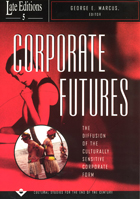
Corporate Futures
The Diffusion of the Culturally Sensitive Corporate Form
Edited by George E. Marcus
University of Chicago Press, 1998
As we approach the end of the century, cultural, institutional, and even geopolitical change becomes the norm rather than the exception. Late Editions, edited by George E. Marcus, is a series of annuals designed to probe these changes not through the familiar academic conventions of analysis but instead through in-depth, informed conversations and interviews with individuals at the sites of these transformations. The casts of other volumes in the series include artists, oncologists, Siberian medical leaders, warhead designers, and computer junkies, all of whom take the opportunity presented by Late Editions to reflect upon the great and often puzzling shifts occurring in the cultural landscape.
Late Editions 5, Corporate Futures, questions this idea of a "cultural landscape" by focusing on the the marked investment of corporations in the concept of culture, long the purview of anthropologists and, more recently, those involved in the humanistic disciplines. Emerging in the discourse of the workplace—and traveling beyond it to traditionally alternative associations—is the idea of a "corporate culture" with its own organization, management policies and practices, and ethos. How can we understand this culture of corporations, and to what extent does it reflect self-contained communities or fragmented human existence in groups under conditions of postmodernity? Corporate Futures tackles these issues and questions through conversations with managers, financial and risk analysts, and other participants in national and international organizations.
The results—engaging, intriguing, speculative, current—continue the work begun in earlier volumes to map the terrain of the present and navigate the uncertain future.
Praise for Late Editions: "If the succeeding volumes are as compassionate and informed as the first, this series could become an essential postmodern guidebook to the world's changing cultural terrain. I plan on letting it ease me into the next century."—Catherine Gysin, Utne Reader
Late Editions 5, Corporate Futures, questions this idea of a "cultural landscape" by focusing on the the marked investment of corporations in the concept of culture, long the purview of anthropologists and, more recently, those involved in the humanistic disciplines. Emerging in the discourse of the workplace—and traveling beyond it to traditionally alternative associations—is the idea of a "corporate culture" with its own organization, management policies and practices, and ethos. How can we understand this culture of corporations, and to what extent does it reflect self-contained communities or fragmented human existence in groups under conditions of postmodernity? Corporate Futures tackles these issues and questions through conversations with managers, financial and risk analysts, and other participants in national and international organizations.
The results—engaging, intriguing, speculative, current—continue the work begun in earlier volumes to map the terrain of the present and navigate the uncertain future.
Praise for Late Editions: "If the succeeding volumes are as compassionate and informed as the first, this series could become an essential postmodern guidebook to the world's changing cultural terrain. I plan on letting it ease me into the next century."—Catherine Gysin, Utne Reader
[more]
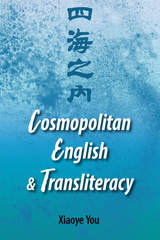
Cosmopolitan English and Transliteracy
Xiaoye You
Southern Illinois University Press, 2016
Winner, CCCC Research Impact Award, 2018
Despite the vast number of multilingual speakers in the United States and the pervasive influence of globalization, writing studies in this country is still inextricably linked to a nationalistic, monolingual English ideology. In Cosmopolitan English and Transliteracy, Xiaoye You addresses this issue by proposing that writing studies programs adopt a cosmopolitan perspective. Emphasizing local and global forms of citizenship and identification, You merges a humanistic vision with the rigor of social science, arguing that linguistic and cultural differences can be explored to recover human connections normally severed by geographical and semiotic borders.
You examines several areas of writing affected by globalization. He then turns to the composition classroom, highlighting the challenges and possibilities of crossing cultural boundaries in academic discourse before introducing a pedagogy aimed at fostering American students’ translingual and transcultural sensibilities. Included is a model for training writing teachers in the context of globalization, which aims to help instructors gain practical knowledge about the needs and resources of multilingual writers through communication technologies and cross-cultural partnerships.
By introducing cosmopolitan perspectives into the composition classroom, You challenges traditional assumptions about language, identity, and literacy as they relate to writing studies. Innovative and provocative, Cosmopolitan English and Transliteracy charts a new way forward for writing programs, with a call to focus on global rather than national identity.
Despite the vast number of multilingual speakers in the United States and the pervasive influence of globalization, writing studies in this country is still inextricably linked to a nationalistic, monolingual English ideology. In Cosmopolitan English and Transliteracy, Xiaoye You addresses this issue by proposing that writing studies programs adopt a cosmopolitan perspective. Emphasizing local and global forms of citizenship and identification, You merges a humanistic vision with the rigor of social science, arguing that linguistic and cultural differences can be explored to recover human connections normally severed by geographical and semiotic borders.
You examines several areas of writing affected by globalization. He then turns to the composition classroom, highlighting the challenges and possibilities of crossing cultural boundaries in academic discourse before introducing a pedagogy aimed at fostering American students’ translingual and transcultural sensibilities. Included is a model for training writing teachers in the context of globalization, which aims to help instructors gain practical knowledge about the needs and resources of multilingual writers through communication technologies and cross-cultural partnerships.
By introducing cosmopolitan perspectives into the composition classroom, You challenges traditional assumptions about language, identity, and literacy as they relate to writing studies. Innovative and provocative, Cosmopolitan English and Transliteracy charts a new way forward for writing programs, with a call to focus on global rather than national identity.
[more]
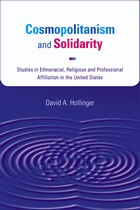
Cosmopolitanism and Solidarity
Studies in Ethnoracial, Religious, and Professional Affiliation in the United States
David A. Hollinger
University of Wisconsin Press, 2006
"Who are we?" is the question at the core of these fascinating essays from one of the nation's leading intellectual historians. With old identities increasingly destabilized throughout the world—the result of demographic migration, declining empires, and the quickening integration of the global capitalist economy and its attendant communications systems—David A. Hollinger argues that the problem of group solidarity is emerging as one of the central challenges of the twenty-first century.
Building on many of the topics in his highly acclaimed earlier work, these essays treat a number of contentious issues, many of them deeply embedded in America's past and present political polarization. Essays include "Amalgamation and Hypodescent," "Enough Already: Universities Do Not Need More Christianity," "Cultural Relativism," "Why Are Jews Preeminent in Science and Scholarship: The Veblen Thesis Reconsidered," and "The One Drop Rule and the One Hate Rule." Hollinger is at his best in his judicious approach to America's controversial history of race, ethnicity, and religion, and he offers his own thoughtful prescriptions as Americans and others throughout the world struggle with the pressing questions of identity and solidarity.
Building on many of the topics in his highly acclaimed earlier work, these essays treat a number of contentious issues, many of them deeply embedded in America's past and present political polarization. Essays include "Amalgamation and Hypodescent," "Enough Already: Universities Do Not Need More Christianity," "Cultural Relativism," "Why Are Jews Preeminent in Science and Scholarship: The Veblen Thesis Reconsidered," and "The One Drop Rule and the One Hate Rule." Hollinger is at his best in his judicious approach to America's controversial history of race, ethnicity, and religion, and he offers his own thoughtful prescriptions as Americans and others throughout the world struggle with the pressing questions of identity and solidarity.
[more]

Critical Moves
Dance Studies in Theory and Politics
Randy Martin
Duke University Press, 1998
In Critical Moves Randy Martin sets in motion an inquiry into the relationship between dance, politics, and cultural theory. Drawing on his own experiences as a dancer as well as his observations as a cultural critic and social theorist, Martin illustrates how the study and practice of dance can reanimate arrested prospects for progressive politics and social change.
From experimental and concert dance to more popular expressions, Martin engages a range of performances and demonstrates how a critical reflection on dance helps promote fluency in the language of mobilization that political theory alludes to yet rarely speaks. He explores how Bill T. Jones’s Last Supper at Uncle Tom’s Cabin/The Promised Land defies attempts to separate social ideas from aesthetic concerns and celebrates multiculturalism in the face of a singular national culture; he studies the choreography in rapper Ice Cube’s video “Wicked,” which confronts racialized depictions of violent crime; and he discusses how racial difference is negotiated by analyzing a hip hop aerobics class in a nonblack environment.
Revealing how mastery of modern dance technique teaches an individual body to express cultural difference and display its intrinsic diversity, Critical Moves concludes with a reflection on the contribution dance studies can make to other fields within cultural studies and social sciences. As such it becomes an occasion to rethink the terms of history and agency, multiculturalism and nationalism, identity and political economy. This book will appeal not only to scholars and practitioners of dance, but also to a wide cross-section of people concerned with the study of political theory and the history of social movements.
From experimental and concert dance to more popular expressions, Martin engages a range of performances and demonstrates how a critical reflection on dance helps promote fluency in the language of mobilization that political theory alludes to yet rarely speaks. He explores how Bill T. Jones’s Last Supper at Uncle Tom’s Cabin/The Promised Land defies attempts to separate social ideas from aesthetic concerns and celebrates multiculturalism in the face of a singular national culture; he studies the choreography in rapper Ice Cube’s video “Wicked,” which confronts racialized depictions of violent crime; and he discusses how racial difference is negotiated by analyzing a hip hop aerobics class in a nonblack environment.
Revealing how mastery of modern dance technique teaches an individual body to express cultural difference and display its intrinsic diversity, Critical Moves concludes with a reflection on the contribution dance studies can make to other fields within cultural studies and social sciences. As such it becomes an occasion to rethink the terms of history and agency, multiculturalism and nationalism, identity and political economy. This book will appeal not only to scholars and practitioners of dance, but also to a wide cross-section of people concerned with the study of political theory and the history of social movements.
[more]
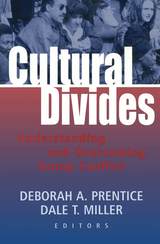
Cultural Divides
Understanding and Overcoming Group Conflict
Deborah Prentice
Russell Sage Foundation, 1999
Thirty years of progress on civil rights and a new era of immigration to the United States have together created an unprecedented level of diversity in American schools, workplaces, and neighborhoods. But increased contact among individuals from different racial and ethnic groups has not put an end to misunderstanding and conflict. On the contrary, entrenched cultural differences raise vexing questions about the limits of American pluralism. Can a population of increasingly mixed origins learn to live and work together despite differing cultural backgrounds? Or, is social polarization by race and ethnicity inevitable? These are the dilemmas explored in Cultural Divides, a compendium of the latest research into the origins and nature of group conflict, undertaken by a distinguished group of social psychologists who have joined forces to examine the effects of culture on social life. Cultural Divides shows how new lines of investigation into intergroup conflict shape current thinking on such questions as: Why are people so strongly prone to attribute personal differences to group membership rather than to individual nature? Why are negative beliefs about other groups so resistent to change, even with increased contact? Is it possible to struggle toward equal status for all people and still maintain separate ethnic identities for culturally distinct groups? Cultural Divides offers new theories about how social identity comes to be rooted in groups: Some essays describe the value of group membership for enhancing individual self-esteem, while others focus on the belief in social hierarchies, or the perception that people of different skin colors and ethnic origins fall into immutably different categories. Among the phenomena explored are the varying degrees of commitment and identification felt by many black students toward their educational institutions, the reasons why social stigma affects the self-worth of some minority groups more than others, and the peculiar psychology of hate crime perpetrators. The way cultural boundaries can impair our ability to resolve disputes is a recurrent theme in the volume. An essay on American cultures of European, Asian, African, and Mexican origin examines core differences in how each traditionally views conflict and its proper methods of resolution. Another takes a hard look at the multiculturalist agenda and asks whether it can realistically succeed. Other contributors describe the effectiveness of social experiments aimed at increasing positive attitudes, cooperation, and conflict management skills in mixed group settings. Cultural Divides illuminates the beliefs and attitudes that people hold about themselves in relation to others, and how these social thought processes shape the formation of group identity and intergroup antagonism. In so doing, Cultural Divides points the way toward a new science of cultural contact and confronts issues of social change that increasingly affect all Americans.
[more]
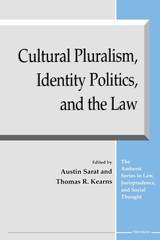
Cultural Pluralism, Identity Politics, and the Law
Austin Sarat and Thomas R. Kearns, Editors
University of Michigan Press, 2001
We are witnessing in the last decade of the twentieth century more frequent demands by racial and ethnic groups for recognition of their distinctive histories and traditions as well as opportunities to develop and maintain the institutional infrastructure necessary to preserve them. Where it once seemed that the ideal of American citizenship was found in the promise of integration and in the hope that none of us would be singled out for, let alone judged by, our race or ethnicity, today integration, often taken to mean a denial of identity and history for subordinated racial, gender, sexual or ethnic groups, is often rejected, and new terms of inclusion are sought. The essays in Cultural Pluralism, Identity Politics, and the Law ask us to examine carefully the relation of cultural struggle and material transformation and law's role in both. Written by scholars from a variety of disciplines and theoretical inclinations, the essays challenge orthodox understandings of the nature of identity politics and contemporary debates about separatism and assimilation. They ask us to think seriously about the ways law has been, and is, implicated in these debates. The essays address questions such as the challenges posed for notions of legal justice and procedural fairness by cultural pluralism and identity politics, the role played by law in structuring the terms on which recognition, accommodation, and inclusion are accorded to groups in the United States, and how much of accepted notions of law are defined by an ideal of integration and assimilation.
The contributors are Elizabeth Clark, Lauren Berlant, Dorothy Roberts, Georg Lipsitz, and Kenneth Karst.
[more]

Culture and Equality
An Egalitarian Critique of Multiculturalism
Brian Barry
Harvard University Press, 2001
All major Western countries contain groups that differ from the mainstream and from each other in religious beliefs, customary practices, or cultural ideas. How should public policy respond to this diversity? Brian Barry challenges the currently orthodox answer and develops a powerful restatement of an egalitarian liberalism for the twenty-first century.
[more]
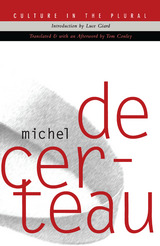
Culture In The Plural
Michel De Certeau
University of Minnesota Press, 1997
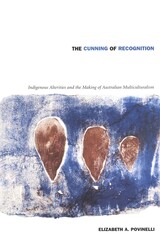
The Cunning of Recognition
Indigenous Alterities and the Making of Australian Multiculturalism
Elizabeth A. Povinelli
Duke University Press, 2002
The Cunning of Recognition is an exploration of liberal multiculturalism from the perspective of Australian indigenous social life. Elizabeth A. Povinelli argues that the multicultural legacy of colonialism perpetuates unequal systems of power, not by demanding that colonized subjects identify with their colonizers but by demanding that they identify with an impossible standard of authentic traditional culture.
Povinelli draws on seventeen years of ethnographic research among northwest coast indigenous people and her own experience participating in land claims, as well as on public records, legal debates, and anthropological archives to examine how multicultural forms of recognition work to reinforce liberal regimes rather than to open them up to a true cultural democracy. The Cunning of Recognition argues that the inequity of liberal forms of multiculturalism arises not from its weak ethical commitment to difference but from its strongest vision of a new national cohesion. In the end, Australia is revealed as an exemplary site for studying the social effects of the liberal multicultural imaginary: much earlier than the United States and in response to very different geopolitical conditions, Australian nationalism renounced the ideal of a unitary European tradition and embraced cultural and social diversity.
While addressing larger theoretical debates in critical anthropology, political theory, cultural studies, and liberal theory, The Cunning of Recognition demonstrates that the impact of the globalization of liberal forms of government can only be truly understood by examining its concrete—and not just philosophical—effects on the world.
Povinelli draws on seventeen years of ethnographic research among northwest coast indigenous people and her own experience participating in land claims, as well as on public records, legal debates, and anthropological archives to examine how multicultural forms of recognition work to reinforce liberal regimes rather than to open them up to a true cultural democracy. The Cunning of Recognition argues that the inequity of liberal forms of multiculturalism arises not from its weak ethical commitment to difference but from its strongest vision of a new national cohesion. In the end, Australia is revealed as an exemplary site for studying the social effects of the liberal multicultural imaginary: much earlier than the United States and in response to very different geopolitical conditions, Australian nationalism renounced the ideal of a unitary European tradition and embraced cultural and social diversity.
While addressing larger theoretical debates in critical anthropology, political theory, cultural studies, and liberal theory, The Cunning of Recognition demonstrates that the impact of the globalization of liberal forms of government can only be truly understood by examining its concrete—and not just philosophical—effects on the world.
[more]
READERS
Browse our collection.
PUBLISHERS
See BiblioVault's publisher services.
STUDENT SERVICES
Files for college accessibility offices.
UChicago Accessibility Resources
home | accessibility | search | about | contact us
BiblioVault ® 2001 - 2024
The University of Chicago Press






